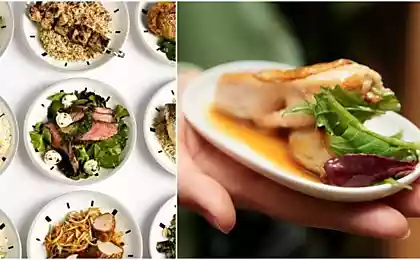215
The psychological aspect of weight loss - do not eat emotions!
The need for food is a physiological need of the body. However, man, being a social and conscious being, in the course of his development began to eat not only for physiological reasons. One reason for consuming food was its use as a stress medicine. So what are the emotions that make us eat, and how do we counter them?
Sadness and hurt. How often, after a fight with someone, we turn to food. At this point, we need support, and we get it in our favorite products. When we feel the need for care, we often want something sweet. This connection is not accidental. When we were little, many of us adults tried to comfort with sweets, saying: “Eat a candy and everything will pass.”
If you are sad and need support, do not look for it in food, it is better to share your emotions with someone and talk heart-to-heart. Fatigue and tension. Very often, when we return home from work, we know that there are more things to do – washing, cleaning, etc. In this case, food becomes a way for us to rest. To give ourselves the opportunity to regain strength, we sit down and eat, delaying homework as far as possible. In this case, you need to listen to your feelings, whether you really want to eat. If not, just stay quiet for 15-20 minutes. Ask your family not to touch you at this time and just rest.

Loneliness and boredom. How many times, when we are at home, we go to the refrigerator, looking for something tasty, opening and closing its door. If you remember yourself at this point, you’ll probably notice that you’re probably bored or at home alone. If you eat out of boredom, then find yourself an interesting activity or meet with friends. The biggest drawback of emotional food is extra pounds. So if you care about your figure, ask yourself often, are you really hungry or are you eating emotions? If you realize that you start eating out of boredom, sadness or fatigue, then try to find a more profitable way for you to cope with these emotions.
Emotional and Physical Hunger: Find 5 Differences
According to psychotherapists and nutritionists, the main differences are:
1. Emotional hunger occurs suddenly, and physiological hunger increases gradually.
2. Under the influence of emotions, people want certain foods, such as pizza or ice cream. As a rule, the body does not agree to a replacement. A truly hungry person is not so fastidious.
3. Emotional craving for food is compulsive, requires immediate satisfaction. Physical hunger can wait.
4. Eating experiences, a person most often continues to absorb food even after feeling full.
5. Eating under the influence of emotions leaves a feeling of guilt.
Source: /users/87
Sadness and hurt. How often, after a fight with someone, we turn to food. At this point, we need support, and we get it in our favorite products. When we feel the need for care, we often want something sweet. This connection is not accidental. When we were little, many of us adults tried to comfort with sweets, saying: “Eat a candy and everything will pass.”
If you are sad and need support, do not look for it in food, it is better to share your emotions with someone and talk heart-to-heart. Fatigue and tension. Very often, when we return home from work, we know that there are more things to do – washing, cleaning, etc. In this case, food becomes a way for us to rest. To give ourselves the opportunity to regain strength, we sit down and eat, delaying homework as far as possible. In this case, you need to listen to your feelings, whether you really want to eat. If not, just stay quiet for 15-20 minutes. Ask your family not to touch you at this time and just rest.

Loneliness and boredom. How many times, when we are at home, we go to the refrigerator, looking for something tasty, opening and closing its door. If you remember yourself at this point, you’ll probably notice that you’re probably bored or at home alone. If you eat out of boredom, then find yourself an interesting activity or meet with friends. The biggest drawback of emotional food is extra pounds. So if you care about your figure, ask yourself often, are you really hungry or are you eating emotions? If you realize that you start eating out of boredom, sadness or fatigue, then try to find a more profitable way for you to cope with these emotions.
Emotional and Physical Hunger: Find 5 Differences
According to psychotherapists and nutritionists, the main differences are:
1. Emotional hunger occurs suddenly, and physiological hunger increases gradually.
2. Under the influence of emotions, people want certain foods, such as pizza or ice cream. As a rule, the body does not agree to a replacement. A truly hungry person is not so fastidious.
3. Emotional craving for food is compulsive, requires immediate satisfaction. Physical hunger can wait.
4. Eating experiences, a person most often continues to absorb food even after feeling full.
5. Eating under the influence of emotions leaves a feeling of guilt.
Source: /users/87
On Tesla Model S electric cars will install innovative batteries for free
What if the son keeps fighting























